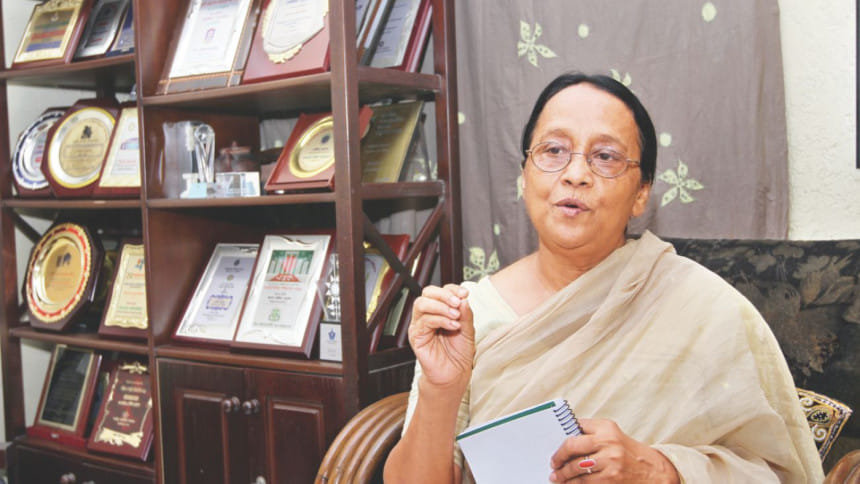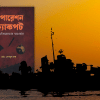In conversation with Selina Hossain

Your 2005 novel 'Bhumi O Kusum' was the first novel in Bangla language to address the much discussed enclave issue which was finally resolved this year. How could you foresee this?
I read about the enclave issue in reports published in different newspapers in 2005. Professor William Van Sandal of the Netherlands had also published a research paper on this subject at that time, which really inspired me. I thought that this could be the subject of a beautiful novel. I then visited Dahgram, Panchagram and Neelphamari. Their lifestyle, joys and sorrows really touched me. I was also moved by the stories of the captive life of some of these people while stories of women being harassed by border guards truly affected me.
You've witnessed the independence of the country as well as famines and a dictatorial regime in your lifetime. How do they feature in your writing?
I am of the opinion that the events of our social, cultural life should be relayed to the next generation through literature. Literature is a medium of art. People of every country want to find their national identity through their respective country's medium of art. This idea entered my head as I wanted engage the next generation with their heritage. On the other hand, I also take this approach to bring about a sense of diversity in the plot of the novel.
Are the characters of 'Hangor Nodi Grenade' taken from your life or are they fictional?
The climax of 'Hangor Nodi Grenade' where one of the characters hands over her son to the Pakistani army is based on an actual case. My teacher, Professor Abdul Hafiz, told me about it. During the Liberation War, he worked in different war fields as a journalist. That's how he learnt about this incident that took place in Kaliganj, Jessore. He came to my house, after entering the country on December 16 with the Allied Forces. After he narrated the incident, he told me to write a story on it. The rest of the story and characters were created by me. Since my childhood, I created female characters in a way that expressed their individual perception in decision making, thus enabling her (the character from 'Hangor Nodi Grenade') to take such a bold decision for the sake of independence. I search for inspiration for characters of my novels in people around me and complete them with the light of my imagination.
Even though the characters of your stories belong to the lower economic strata, they are revolutionary in nature. Is this resistance against the government or the status quo?
Being revolutionary gives voice to an individual. A person has to be revolutionary in all aspects of life. The person with a submissive attitude toward life is bound to lose his sense of individuality. In my stories, people from the lower strata of the economy are given the dignity that every human being deserves. They protest against injustice regardless of who commits it.
Despite great strides in female empowerment, why has there not been a reflection of it in literature?
Women writers have truly advanced in the world of literature. It is important to note that literature is not the place for apology. Literature is a place for creativity. Creativity is the development of power. There's no difference between man and woman here.
'Japito Jibon' is a captivating take on the Language Movement. Could you please talk about that?
'Japito Jibon' is a novel based on the Language Movement. I think this novel allows readers to look back at their own heritage and that's why it carries such an appeal for them.
Your novel 'Purno Chobir Mognota' is about the world renowned poet Rabindranath Tagore. Was it difficult to write about such an eminent personality?
'Purno Chobir Mognota' is based on the years Rabindranth spent in this region. I attempted to show a glimpse of the current state of the East Bengal River and the lives of the poor people. He would not have been able to gain the experience of how the masses lived if he hadn't stayed in our region. I based the names of the characters of my story on the stories that he wrote here. This is how I tried to see the time and life of Rabindranath in a new light.
What are your plans for the future?
I want to write about different issues of the country. I am planning to write a story on the refugees during the Liberation War. I also want to write on the Rohingyas and the Chittagong Hill Tracts issues.
What is the extent of social responsibility of a writer?
The belief of 'art for art's sake' was dismissed several centuries ago. Social responsibility is the realisation of every creative being. It's important to actualise this realisation. However, if anyone wants to avert this responsibility, they can. They are free to do that.
What role did your family play in your pursuit of creativity?
My family always supported me since the beginning of my writing life and that's why I have been able to stick to this profession for the last 51 years. And that's how I was able to balance my writing with the other responsibilities of my life. I am thankful for everyone's support and cooperation.
Many believe that our literature is under immense pressure due to globalisation. How true do you think that is?
Our literature is our asset. I don't think it's under pressure from globalisation. Presently, talks of the habit of reading being on the decline are doing the rounds. This doesn't mean that readers read foreign literature; they don't read at all. National literature is integral to the existence of a nation. Enlightened people would never throw this away under any kind of pressure. Those who claim otherwise suffer from narrow-mindedness.
You have established yourself as one of the greatest fiction writers of contemporary times. In this context, how would you rate yourself as a reader?
I've been a bookworm since the time I started writing. During my university days, I would stay for long hours in the library while my peers would hang out or engage in chit-chat. Apart from study materials, I read other books with equal attention. As a reader, I'm not all that bad.
At the moment I'm reading Ismail Kader's 'The General of the Dead Army,' which is translated from French and received the Man Booker International Prize. Ismail, originally from Albania, currently lives in Paris.
Recently, the killing of bloggers, their publishers, two foreigners and death threats to some prominent citizens have created a sense of fear among people. How do you see this situation?
I am shocked. No one deserves to die like this. These incidents occur in a state of lawlessness. If the perpetrators are not brought to justice, these crimes will continue. Our call is to the government to take necessary steps to ensure safety and rule of law.
Translated by The Editorial Desk

 For all latest news, follow The Daily Star's Google News channel.
For all latest news, follow The Daily Star's Google News channel. 








Comments